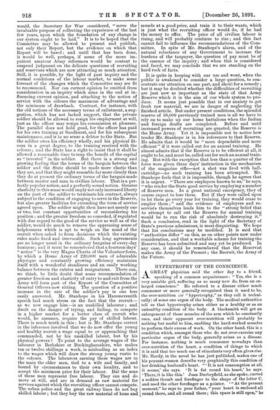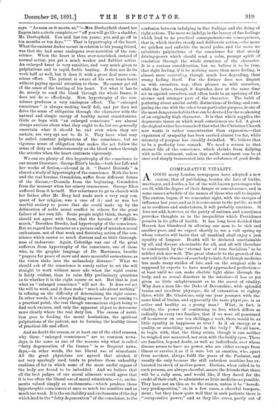HYPERTROPHY OF THE CONSCIENCE.
AGREAT physician said the other day to a friend, speaking of a common acquaintance : "Yes, she is a very amiable girl, suffering as so many now do, from an en- larged conscience." He referred to a disease either much commoner or more generally recognised than it used to be, the over-nutrition (or "hypertrophy," as they call it techni- cally) of some one organ of the body. The medical authorities tell us that hypertrophy arises either as a healthy or as an unhealthy condition of the body. A blacksmith will get an enlargement of those muscles of the arm which he constantly uses, and their apparent over-nutrition will probably be nothing but useful to him, enabling the hard-worked muscles to perform their excess of work. On the other hand, this is a condition which, amongst those who do not over-exercise any particular organ of the body, generally arises as a disease. For instance, nothing is much commoner nowadays than over-nutrition of the heart, a condition of things to which it is said that too much use of stimulants very often gives rise. Mr. Hardy, in the novel he has just published, makes one of his peasant-women describe very graphically this condition of her drinking husband's heart. " It is not consumption at all,
it seems,' she says. It is fat round his heart,' he says.
There, it is like this.' Joan Durbeyfield, as she spoke, curved a sodden thumb and forefinger to the shape of the letter C, and-used the other forefinger as a pointer. 4 " At the present moment," he says to your father, "your heart is enclosed all round there, and all round there; this space is still open," he
says. "As soon as it meets, so," '—Mrs. Durbeyfield closed her fingers into a circle complete,—' "off you will go like a shadder, Mr. Darbeyfield. You mid last ten years ; you mid go off in ten months or ten days." ' That is hypertrophy of the heart. What the eminent doctor meant in relation to his young friend, was that she had some analogous over-nutrition of the con- science. When the heart is thus over-nourished, instead of normal action, you get a much weaker and flabbier action. An enlarged heart is very sensitive, and very much given to palpitations and to rapid, feeble beating. It does not do its work half as well, but it does it with a great deal more con. scions effort. The patient is aware of his own heart-beats without paying special attention to them. He cannot get rid of the sense of the beating of his heart. Yet what it has to do, merely to send the blood through the whole frame, it does not do so effectively. Now, hypertrophy of the con- science produces a very analogous effect. The "enlarged conscience" is always making itself felt, and yet does not drive the sense of obligation through the character with the natural and simple energy of healthy moral constitutions. Girls or boys with "an enlarged conscience" are almost always anxious about what they ought to do, but are generally uncertain what it should be, and even when they are certain, are very apt not to do it. They have what may be called constant palpitations of the conscience, but no vigorous sense of obligation that makes the act follow the sense of duty as instantaneously as the blood rushes through the arteries when the heart contracts vigorously.
We can see plenty of this hypertrophy of the conscience in our recent literature. George Eliot's books,—both her Life and her works of fiction,—abound in it. "Daniel Deronda " is almost a study of hypertrophy of the conscience. Bath the hero and the real heroine, Gwendolen, suffer from different forms of the disease,—Deronda from the beginning, Gwendolen from the moment when her misery commences. George Eliot suffered from it herself. Her reluctance to go to church with her father after Mr. Bray had made such a very easy con- quest of her religion, was a case of it; and so was her morbid anxiety to prove that she could make up by the delineation of noble moral conflict in others, for the great failure of her own life. Some people might think, though we should not agree with them, that the heroine of "Middle- march," Dorothea Brooke, had hypertrophy of the conscience. But we regard her character as a picture only of mistaken moral enthusiasm, not of that weak and fluttering action of the con- science which causes so much distress and so little thorough- ness of endeavour. Again, Coleridge was one of the great sufferers from hypertrophy of the conscience, one of those who, in the graphic language of Dr. Martineau, breathe "prayers for peace of more and more mournful earnestness, as the vision sinks into the melancholy distance." What we should ask of the conscience is surely rather to set the will straight to work without more ado when the right course is fairly evident, than to raise fifty preliminary questions as to whether it is the right course or not. But that is just what an "enlarged conscience" will not do. It does not set the will to work, and it does make "much ado about nothing" in refining on the difficulty of determining the right course. In other words, it is always finding excuses for not coming to a practical point, the real though unconscious object being to find such excuses, and only the apparent object to determine more clearly where the real duty lies. The excess of nutri- tion goes to feeding the moral hesitations, the spiritual palpitations of the patient, not to forming the healthy tissue of practical life and effort.
And no doubt the reason, or at least one of the chief reasons, why these "enlarged consciences" are so common nowa- days, is the same as one of the reasons why what is called "fatty degeneration of the tissues" is so frequent now& days,—in other words, the too liberal use of stimulants. All the great physicians are agreed that alcohol, if not very sparingly used, tends to produce those unhealthy cushions of fat in which some of the most useful organs of the body are found to be imbedded. And we believe that all the best judges of our moral ailments would agree that it is too often the liberal use of moral stimulants,—i.e., excite- ments valued simply as excitements,—which produce those hypertrophic consciences at once so much too sensitive and so much too weak. It is the excitability and excitements of the day which lead to the "fatty degeneration" of the conscience, to the confusion between indulging in fine feelings and the doing of right actions. The more we indulge in the luxury of fine feelings which lead to no practical consequences,—no consequences, that is, which involve steady and deliberate action,—the more we quicken and enfeeble the moral pulse, and the more we substitute palpitations of the conscience for that steady driving-power which should send a calm, prompt spirit of resolution through the whole structure of the character. It is a curious consideration, but we believe it to be true, that right feeling, if it be nothing more than mere feeling, is almost more enervating, though much less degrading, than wrong feeling itself. For the former does not disgust us with ourselves, nay, often pleases us with ourselves, while the latter, though it degrades, does at the same time set us against ourselves, and often leads to an uprising of the sterner and stronger part of the character. The habit of pottering about amidst subtle distinctions of feeling, and com- paring the one with the other to no particular purpose, is one of the most dangerous habits that can be devised for the weakening of an originally high character. It is that which supplies the degenerate tissue on which weak consciences are fed. A great theological writer has remarked that what the Christian Church now wants is rather concentration than expansion,—that expansion of sympathy has been carried almost too far, while intensity of purpose has steadily dwindled. We believe that to be a perfectly true remark. We need a return to that sterner life of the conscience, which shrinks from dallying with noble sentiment, unless that noble sentiment can be at once and simply transmuted into the substance of good deeds.



































 Previous page
Previous page